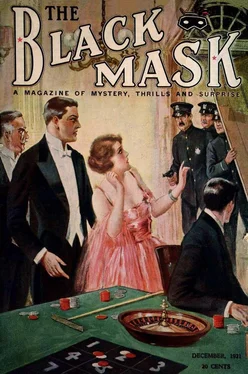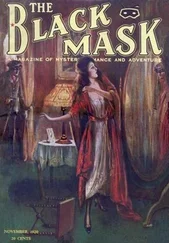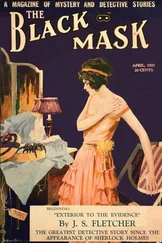Meredith Beyers - The Black Mask Magazine (Vol. 4, No. 3 — December 1921)
Здесь есть возможность читать онлайн «Meredith Beyers - The Black Mask Magazine (Vol. 4, No. 3 — December 1921)» весь текст электронной книги совершенно бесплатно (целиком полную версию без сокращений). В некоторых случаях можно слушать аудио, скачать через торрент в формате fb2 и присутствует краткое содержание. Город: New York, Год выпуска: 1921, Издательство: Pro-distributors Publishing Company, Жанр: Классический детектив, на английском языке. Описание произведения, (предисловие) а так же отзывы посетителей доступны на портале библиотеки ЛибКат.
- Название:The Black Mask Magazine (Vol. 4, No. 3 — December 1921)
- Автор:
- Издательство:Pro-distributors Publishing Company
- Жанр:
- Год:1921
- Город:New York
- ISBN:нет данных
- Рейтинг книги:3 / 5. Голосов: 1
-
Избранное:Добавить в избранное
- Отзывы:
-
Ваша оценка:
- 60
- 1
- 2
- 3
- 4
- 5
The Black Mask Magazine (Vol. 4, No. 3 — December 1921): краткое содержание, описание и аннотация
Предлагаем к чтению аннотацию, описание, краткое содержание или предисловие (зависит от того, что написал сам автор книги «The Black Mask Magazine (Vol. 4, No. 3 — December 1921)»). Если вы не нашли необходимую информацию о книге — напишите в комментариях, мы постараемся отыскать её.
The Black Mask Magazine (Vol. 4, No. 3 — December 1921) — читать онлайн бесплатно полную книгу (весь текст) целиком
Ниже представлен текст книги, разбитый по страницам. Система сохранения места последней прочитанной страницы, позволяет с удобством читать онлайн бесплатно книгу «The Black Mask Magazine (Vol. 4, No. 3 — December 1921)», без необходимости каждый раз заново искать на чём Вы остановились. Поставьте закладку, и сможете в любой момент перейти на страницу, на которой закончили чтение.
Интервал:
Закладка:
He passed no one on the road. Everything was coming his way. As he gained his room unobserved he was whistling softly. Not a pang of remorse came to sear his conscience. Ridgely wasn’t that kind. He turned in and slept like a top.
He was awakened by a sharp knocking on the room door. Bright sunlight was streaming in through the thinly curtained windows. A hasty glance at the clock told him that it was after ten. The knocking continued insistently.
He sprang out of bed and reached for his bathrobe.
“Just a minute!” he called, as he hurriedly pulled a comb through his tousled hair.
An instant later, fairly presentable, he was gazing inquiringly at the tall young man who had pushed in through the partly opened door.
Even before the other had introduced himself, Ridgely knew that his caller was a detective. Something must have gone wrong, he thought, and his mind went racing swiftly over the details of the evening before, seeking to find and forestall the consequences of a slip. He was not panicky.
His visitor was speaking. “John Maury was found dead on the road late last night, Mr. Ridgely.”
Ridgely carefully side-stepped a possible trap. “An accident?” he asked, in perfectly done surprise and concern.
“No,” replied the other. “He was murdered.”
Ridgely concealed his dismay. How in the devil had they reached that conclusion so soon in the face of his carefully prepared evidence to the contrary?
“Murdered!” he echoed, blankly. “How? By whom?”
The tall young man sat down, watching Ridgely narrowly. His right hand had dropped carelessly into his pocket. He leaned forward slightly, and spoke swiftly.
“By you, Mr. Ridgely,” he replied, evenly. “No. Don’t interrupt. You set a very pretty stage, my friend, and you have been careful — careful to a fault. It was your little finishing touch that betrayed you. That, and a woman’s vanity. Mrs. Maury is a very beautiful woman with a very plain name. It has been her little failing to hide that fact. Her name is not Jean, Ridgely, it’s Jane. And Maury never called her anything else in private. When she saw that letter you so cleverly left she knew Maury had never written it despite the excellent forgery. For he hated the name Jean as much as she disliked Jane. She is a big enough woman to admit her own shortcomings, and—. Shall I read the warrant?”
The Trap Thief
by Hy. S. Watson and Asa Steele
I
“The low-down sneaking thief!”
Jack Ramsey’s wrath hissed on his lips as he flung the steel traps to the ground. Of thirty, all but two had been stolen.
Wrinkles of perplexity seamed his face as he sprawled on a great rock in the wilderness, munched his lunch and stared at a distant hilltop.
Jack Ramsey’s blue-gray eyes did not lack shrewdness. With his tawny hair, long face and lean jaw, they were combined in a type of youth not easily deceived. He concluded that the thief had followed him the night before through brush, fern and swamp and taken each trap as soon as he had moved on to the next one.
But why steal them? The thief had a grudge against him? He had come from the neighboring town of Honesdale, where he had lost his job in a mill, and was trapping here till he got other work. Being a stranger in the neighborhood, he could have no enemies. Perhaps, his traps had been stolen by a some hobo—
The thought brought Jack upstanding. Tossing the crumbs of his lunch to a scolding squirrel, he set off at a brisk pace northward.
The confidence of his advance proved that no part of this strange place was unfamiliar to him. Yet few domains of equal size set up so many barriers against a close acquaintance. In some distant age a great glacier, crushing and combing the mountains to the north as it advanced, had here found a conqueror in hot sunshine. As the ice field melted, vast masses of granite boulders, pebbles and gravel buried in the frozen depths were cast into hummocks resembling little mountains, or piled in driftways or stacks like playing cards or ears of corn, in indescribable confusion. Thus was formed this utterly barren, haphazard place some five miles square, now honeycombed with swamps or covered, where the rocks permitted, by bush or forest.
Around this land passed modern highways. Aeroplanes soared overhead. Toward it, thriving New Jersey towns were crowding close. Thirty-five miles away, as the crow flies, stood the City Hall of New York, the world’s greatest metropolis. Yet the hardships that must be faced while penetrating this natural fortress caused it to remain almost unknown and shunned by men.
Jack Ramsey recalled having seen, while hunting in previous years, a deserted cabin built by lumbermen on a rocky knoll near the northern end of the wilderness. Here might live the tramps who were helping themselves to his traps. He would call them to time.
His visit to the cabin was one of surprises. From the crooked chimney curled smoke that intrigued his nostrils with odors of sassafras and newly made coffee. Crumbling woodwork had been replaced and the windows reglazed and hung with curtains of snowy whiteness. Flowers were blooming in a border along a wall.
The door was opened by an upstanding, buxom girl, sweet and wholesome as the sunshine that had tanned her cheeks and bare forearms. At sight of him, her eyes brightened.
“A drink of water, please?”
“Sure thing! Bring fresh water, Jimmie.”
The man addressed was sitting in a corner shaping a billet of wood with a hunting knife. When he raised his pale, bearded face Ramsey recognized Jimmie Willets, a half-wit whom he had met in the wilderness.
“Jimmie’s my policeman while Dad’s away,” the girl volunteered. “There’s just my father and me, and for me to be here alone all day while he’s at work — I just couldn’t! Oh! I forgot! I’m Mary Gage—”
“I’m Jack Ramsey, from Honesdale.”
While Jimmie Willets brought the water and Jack drank of the cool, sweet draft, the young trapper fell into chat with the girl like an old friend. Jack sensed a warm and gracious womanhood and the invitation of one hungry for companionship, while the girl, with that instinctive wisdom as old as womankind, whetted his interest by urging him to talk about himself.
“It’s a great life I lead here!” he enthused. “Even the winds blow sweet and clean! I can breathe free, dream free and hope free! This is the American’s heritage! It’s his when the mystery of blue distances gets into his heart—”
“My! With all those fine thoughts you should have a more romantic name,” she teased, an appraising common sense behind her laughter. “It makes me think of Buffalo Bill and Leatherstocking, and savage men hunting wild beasts — I have it! Hereafter, I’ll call you ‘Lean Jaw’!”
He felt the sting of her raillery as he laughed with her. Yet he would not have had it otherwise, longed for it again.
“Truly, though,” he went on, “in a desert like this you might almost expect to see Indians— Oh! Don’t be frightened. You folks and I are the only people here. I’ve had no company but the skunk, stray mink and what-not that are caught in my traps. Yet I don’t get lonely, do you?”
“Oh, no!”
Was she interested in hunting? Jack thought she might explore the wilderness with him and see his traps.
“Then you’re the man whose traps were stolen?” she asked quickly, as if the words had escaped her unawares.
“You know about that?”
She went to a dresser and took from it five new steel traps, which she flung on a table at Ramsey’s elbow.
“They’re mine!” he cried. “Stolen last night!”
“I found them on the road to Honesdale,” she replied.
“But that’s five miles away! You’ve been down there so early in the day?”
Читать дальшеИнтервал:
Закладка:
Похожие книги на «The Black Mask Magazine (Vol. 4, No. 3 — December 1921)»
Представляем Вашему вниманию похожие книги на «The Black Mask Magazine (Vol. 4, No. 3 — December 1921)» списком для выбора. Мы отобрали схожую по названию и смыслу литературу в надежде предоставить читателям больше вариантов отыскать новые, интересные, ещё непрочитанные произведения.
Обсуждение, отзывы о книге «The Black Mask Magazine (Vol. 4, No. 3 — December 1921)» и просто собственные мнения читателей. Оставьте ваши комментарии, напишите, что Вы думаете о произведении, его смысле или главных героях. Укажите что конкретно понравилось, а что нет, и почему Вы так считаете.












